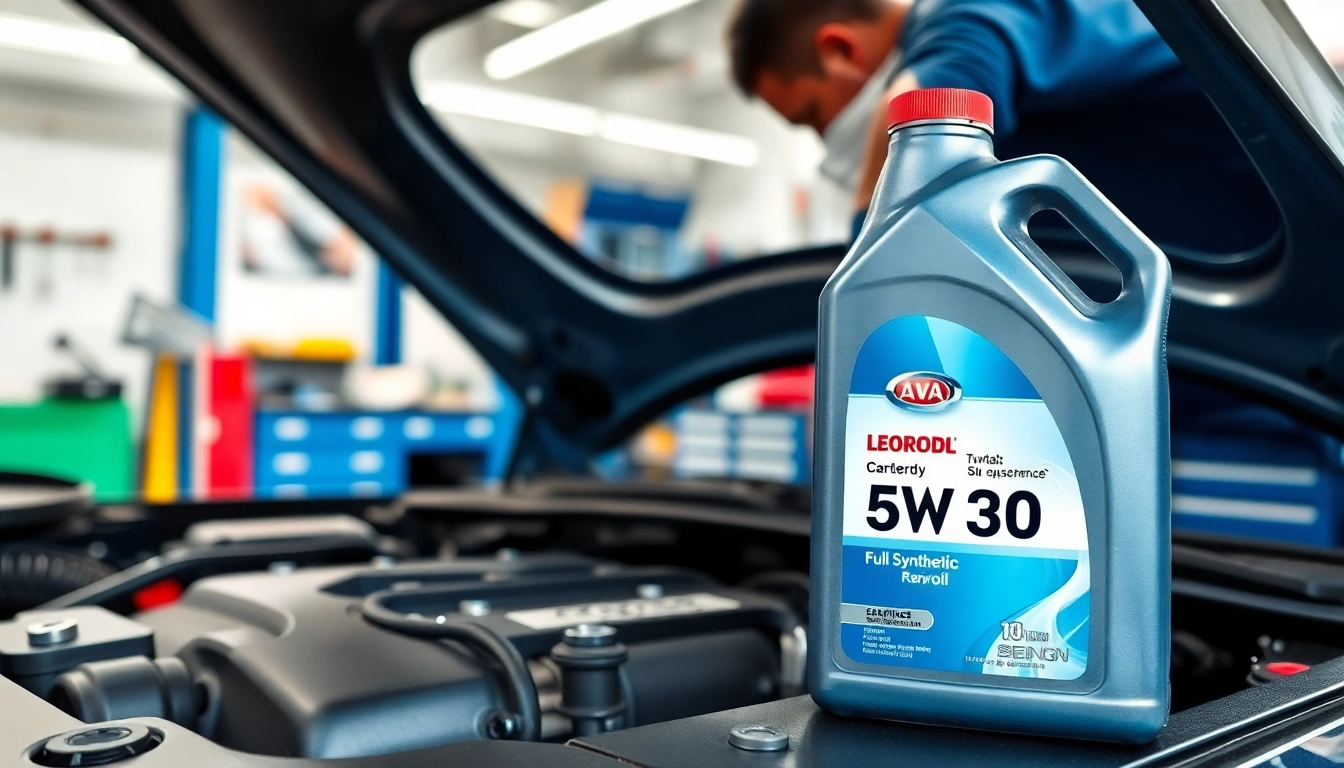
Understanding Full Synthetic 5W30 Oil
What is Full Synthetic Oil?
Full synthetic oil is an advanced formulation made from chemically modified petroleum components. This type of oil offers superior lubrication, wear protection, and efficiency compared to standard conventional oils. The term “full synthetic” means that the oil is created entirely through chemical processes, resulting in uniform molecules that provide exceptional performance under various conditions.
In particular, full synthetic 5w30 oil has grown in popularity among car owners and enthusiasts for its ability to perform efficiently in diverse environments, offering enhanced engine protection and longevity.
Benefits of Using Full Synthetic 5W30 Oil
Choosing full synthetic 5W30 oil for your vehicle presents numerous advantages:
- Superior Engine Protection: Full synthetic oils are engineered to offer superior protection against wear and tear. Their chemical composition allows them to cling to engine components better than conventional oils, thus reducing friction and enhancing overall efficiency.
- Extended Oil Change Intervals: When compared to conventional oils, full synthetics can endure longer periods between oil changes due to their superior resistance to breakdown. Many manufacturers recommend changing full synthetic oil every 7,500 to 15,000 miles, depending on driving conditions.
- Temperature Stability: Full synthetic oils maintain their viscosity across a broader temperature range, providing consistent lubrication during cold starts and high temperatures.
- Improved Fuel Economy: The friction-reducing characteristics of synthetic oils can lead to enhanced fuel efficiency, saving you money at the pump over time.
- Cleaner Engine: Full synthetics are less likely to break down and produce sludge and deposits, keeping the engine cleaner and promoting better performance.
How Full Synthetic 5W30 Oil Compares to Conventional Oils
When comparing full synthetic 5W30 oil to conventional oils, several critical differences become apparent:
- Molecular Structure: Synthetic oils have a more uniform molecular structure, which allows them to flow more easily and provide better lubrication than conventional oils composed of varied sized molecules.
- Performance: Synthetic oils deliver superior performance under extreme conditions (hot or cold), while conventional oils may become less effective in similar scenarios.
- Longevity: While conventional oils can break down over time and need replacing more frequently, full synthetics are designed to last longer, thus reducing overall maintenance costs.
- Environmental Impact: Synthetic oils, being less prone to breaking down, lead to lesser waste and oil disposal issues. Many also contain fewer harmful impurities compared to conventional oils.
Choosing the Right Full Synthetic 5W30 Oil for Your Car
Top Recommended Brands and Products
There are many reputable brands offering high-quality full synthetic 5W30 oils. Here are some of the top recommended products:
- Mobil 1 Extended Performance 5W30: Known for its protection and performance, it is often a go-to choice for many car owners.
- Valvoline Advanced Full Synthetic 5W30: Offers superior cleanliness and wear protection, making it a great choice for both regular and high-mileage vehicles.
- Pennzoil Platinum Full Synthetic 5W30: Made from natural gas, it provides excellent cleanliness and engine protection.
- Castrol EDGE 5W30: Recognized for its advanced technology that fills microscopic gaps to prevent wear.
- Royal Purple High Performance 5W30: Known for delivering increased performance and engine protection.
Identifying Quality Full Synthetic 5W30 Oils
To ensure you’re choosing a high-quality full synthetic 5W30 oil, consider the following factors:
- API and ILSAC Ratings: Always look for the latest API (American Petroleum Institute) and ILSAC (International Lubricant Standardization and Approval Committee) certifications on the label, indicating that the oil meets industry standards.
- Brand Reputation: Trustworthy brands with a long-standing reputation often go through rigorous testing and development processes, providing assurance of their product quality.
- Consumer Reviews: Before making a purchase, read user reviews and testimonials. They provide insights from real users regarding the performance and reliability of the product.
- Price vs. Performance: While more expensive oils are often higher quality, it’s essential to weigh the cost against the performance benefits they provide based on your driving habits.
Considering Your Vehicle’s Specifications
Before settling on a specific full synthetic 5W30 oil, always check your vehicle’s owner’s manual for manufacturer recommendations. These specifications can include:
- The proper viscosity grade required.
- Any specific oil brand or formulation recommended by the manufacturer.
- Recommended oil change intervals tailored to your vehicle’s performance needs.
Following the manufacturer’s recommendations ensures optimal engine performance and longevity.
The Importance of Regular Oil Changes
How Often Should You Change Full Synthetic 5W30 Oil?
The frequency of oil changes largely depends on your driving habits and the manufacturer’s recommendations. Typically, synthetic oil can last longer than conventional oils:
- For most vehicles, changing synthetic oil every 7,500 to 15,000 miles is ideal.
- If you drive under severe conditions (extreme temperatures, stop-and-go traffic, towing), you might need changes more frequently.
Signs Your Oil Needs Changing
Monitoring your oil’s condition is crucial for maintaining engine health. Here are some signs that it may be time for a change:
- Dark or Dirty Oil: Clean engine oil appears amber in color. If the oil looks dark or gritty, it is likely time for a change.
- Oil Change Light: If your vehicle’s dashboard oil light illuminates, it’s a strong indicator that an oil change is due.
- Engine Noise: Unusual engine sounds can signify that oil is breaking down and not providing sufficient protection.
- Increased Engine Temperature: Oil helps regulate engine temperature; if it is low or old, your engine may overheat.
DIY vs. Professional Oil Change
Many vehicle owners grapple with the choice between performing a DIY oil change and hiring a professional. Both options have their merits:
- DIY Oil Change: This route can save money and give you hands-on familiarity with your vehicle. However, it demands proper tools, time, and a good understanding of the process.
- Professional Oil Change: Neglecting proper disposal and ensuring the job is done correctly can be pitfalls of DIY. A professional service guarantees that your oil change is performed correctly and safely, often providing additional services like oil filter changes and fluid inspections.
Maximizing Engine Longevity with Full Synthetic 5W30 Oil
Performance Enhancements from Synthetic Oils
Using full synthetic 5W30 oil not only provides essential lubrication but also enhances performance significantly. These enhancements include:
- Higher Viscosity Index: Synthetic oils have a higher viscosity index, which means they have less fluctuation in viscosity with temperature changes.
- Enhanced Oxidation Stability: Full synthetics can resist oxidation and thermal breakdown, allowing for superior performance in extreme temperatures.
- Lower Volatility: Full synthetic oils evaporate less quickly, which reduces oil consumption and maintains optimal levels longer.
Avoiding Common Mistakes in Oil Maintenance
To maximize the benefits of your full synthetic oil, it’s important to avoid common pitfalls:
- Ignoring Oil Levels: Regularly check your oil levels to ensure your engine is adequately lubricated.
- Delayed Oil Changes: Don’t push your oil change intervals too far; adhere to your routine to keep engine wear minimized.
- Neglecting the Oil Filter: Always replace the oil filter during an oil change to ensure that contaminants are not recirculated.
Monitoring Oil Levels and Quality
Effective maintenance involves consistent monitoring of your oil. Check your levels at each fuel fill-up and consider these tips:
- Use the dipstick to check the oil level and its color. Looks for changes in clarity and consistency that could indicate contamination or degradation.
- Invest in a quality oil analysis. Some mechanics offer this service, allowing you to evaluate the actual condition of the oil and the health of your engine.
FAQs on Full Synthetic 5W30 Oil
What Vehicles Benefit from Full Synthetic 5W30 Oil?
Cars that are typically recommended to use full synthetic 5W30 oil include:
- Performance vehicles that demand higher levels of performance and engine protection.
- Modern engines with tighter tolerances necessitating better lubrication.
- Vehicles that experience extreme weather conditions.
Are There Any Disadvantages to Using Full Synthetic Oil?
While full synthetic oils have incredible benefits, there can be a few downsides:
- Cost: Full synthetic oils can be more expensive than conventional oils, although the longer change intervals can offset this expense.
- Compatibility Issues: Some older engines may not have been designed for synthetic oils. It’s essential to consult with a mechanic if you’re unsure.
Cost vs. Value: Is Full Synthetic 5W30 Oil Worth It?
Ultimately, the cost of full synthetic 5W30 oil can be justified by the value it provides. Enhanced performance, increased engine longevity, and reduced maintenance costs make it a worthwhile investment for many vehicle owners. Moreover, as vehicles become more advanced, the need for high-quality oils like full synthetic becomes even more essential.







